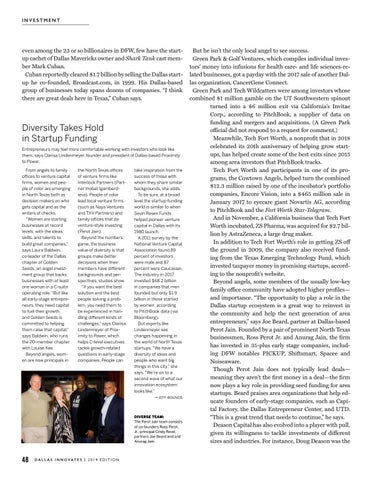INVESTMENT
even among the 23 or so billionaires in DFW, few have the startup cachet of Dallas Mavericks owner and Shark Tank cast member Mark Cuban. Cuban reportedly cleared $1.7 billion by selling the Dallas startup he co-founded, Broadcast.com, in 1999. His Dallas-based group of businesses today spans dozens of companies. “I think there are great deals here in Texas,” Cuban says.
Diversity Takes Hold in Startup Funding Entrepreneurs may feel more comfortable working with investors who look like them, says Clarisa Lindenmeyer, founder and president of Dallas-based Proximity to Power. From angels to family offices to venture capital firms, women and people of color are emerging in North Texas both as decision makers on who gets capital and as the writers of checks. “Women are starting businesses at record levels, with the ideas, skills, and talents to build great companies,” says Laura Baldwin, co-leader of the Dallas chapter of Golden Seeds, an angel investment group that backs businesses with at least one woman in a C-suite operating role. “But like all early-stage entrepreneurs, they need capital to fuel their growth, and Golden Seeds is committed to helping them raise that capital,” says Baldwin, who runs the 20-member chapter with Louise Kee. Beyond angels, women are now principals in
the North Texas offices of venture firms like Interlock Partners (Partner Inobat Igamberdieva). People of color lead local venture firms (such as Naya Ventures and TXV Partners) and family offices that do venture-style investing (Perot Jain). Beyond the numbers game, the business value of diversity is that groups make better decisions when their members have different backgrounds and perspectives, studies show. “If you want the best solution and the best people solving a problem, you need them to be experienced in handling different kinds of challenges,” says Clarisa Lindenmeyer of Proximity to Power, which helps C-level executives tackle growth-related questions in early-stage companies. People can
take inspiration from the success of those with whom they share similar backgrounds, she adds. To be sure, at a broad level the startup-funding world is similar to when Sevin Rosen Funds helped pioneer venture capital in Dallas with its 1980 launch. A 2011 survey by the National Venture Capital Association found 89 percent of investors were male and 87 percent were Caucasian. The industry in 2017 invested $68.2 billion in companies that men founded but only $1.9 billion in those started by women, according to PitchBook data (via Bloomberg). But experts like Lindenmeyer see changes happening in the world of North Texas startups. “We have a diversity of ideas and people who want big things in this city,” she says. “We’re on to a second wave of what our innovation ecosystem looks like.” —JEFF BOUNDS
DIVERSE TEAM: The Perot Jain team consists of co-founders Ross Perot, Jr., principal Cindy Revol, partners Joe Beard and and Anurag Jain.
48
D A L L A S I N N O VAT E S | 2 0 1 9 E D I T I O N
But he isn’t the only local angel to see success. Green Park & Golf Ventures, which compiles individual investors’ money into infusions for health care- and life sciences-related businesses, got a payday with the 2017 sale of another Dallas organization, CancerGene Connect. Green Park and Tech Wildcatters were among investors whose combined $1 million gamble on the UT Southwestern spinout turned into a $6 million exit via California’s Invitae Corp., according to PitchBook, a supplier of data on funding and mergers and acquisitions. (A Green Park official did not respond to a request for comment.) Meanwhile, Tech Fort Worth, a nonprofit that in 2018 celebrated its 20th anniversary of helping grow startups, has helped create some of the best exits since 2015 among area investors that PitchBook tracks. Tech Fort Worth and participants in one of its programs, the Cowtown Angels, helped turn the combined $12.3 million raised by one of the incubator’s portfolio companies, Encore Vision, into a $465 million sale in January 2017 to eyecare giant Novartis AG, according to PitchBook and the Fort Worth Star-Telegram. And in November, a California business that Tech Fort Worth incubated, ZS Pharma, was acquired for $2.7 billion by AstraZeneca, a large drug maker. In addition to Tech Fort Worth’s role in getting ZS off the ground in 2009, the company also received funding from the Texas Emerging Technology Fund, which invested taxpayer money in promising startups, according to the nonprofit’s website. Beyond angels, some members of the usually low-key family office community have adopted higher profiles— and importance. “The opportunity to play a role in the Dallas startup ecosystem is a great way to reinvest in the community and help the next generation of area entrepreneurs,” says Joe Beard, partner at Dallas-based Perot Jain. Founded by a pair of prominent North Texas businessmen, Ross Perot Jr. and Anurag Jain, the firm has invested in 35-plus early stage companies, including DFW notables PICKUP, Shiftsmart, Spacee and Noiseaware. Though Perot Jain does not typically lead deals— meaning they aren’t the first money in a deal—the firm now plays a key role in providing seed funding for area startups. Beard praises area organizations that help educate founders of early-stage companies, such as Capital Factory, the Dallas Entrepreneur Center, and UTD. “This is a great trend that needs to continue,” he says. Deason Capital has also evolved into a player with pull, given its willingness to tackle investments of different sizes and industries. For instance, Doug Deason was the
